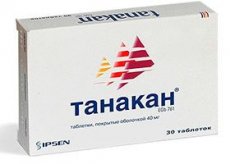Medical expert of the article
New publications
Preparations
Tanacan
Last reviewed: 03.07.2025

All iLive content is medically reviewed or fact checked to ensure as much factual accuracy as possible.
We have strict sourcing guidelines and only link to reputable media sites, academic research institutions and, whenever possible, medically peer reviewed studies. Note that the numbers in parentheses ([1], [2], etc.) are clickable links to these studies.
If you feel that any of our content is inaccurate, out-of-date, or otherwise questionable, please select it and press Ctrl + Enter.

The herbal preparation Tanakan is intended to improve cerebral and peripheral blood flow, as well as to eliminate signs of dementia.
Indications Tanakana
The herbal remedy Tanakan can be used:
- in case of cognitive and neurosensory impairment of various etiologies (with the exception of Alzheimer's and Parkinson's diseases);
- with intermittent claudication that accompanies chronic forms of obliterating angiopathy of the legs (second degree according to the Fontaine scale);
- in case of visual impairment caused by vascular pathologies;
- in case of hearing loss, tinnitus, dizziness and vestibular disorders of vascular etiology;
- with Raynaud's syndrome.
Release form
Tanakan is produced in two dosage forms:
- film-coated tablets, bright red in color, round, have a characteristic aroma;
- Liquid for oral use, yellow-brown in color, has a characteristic aroma.
The tablets are sealed in blister strips, 15 tablets in each strip. A cardboard pack may contain two or six strips.
The liquid is packaged in dark glass bottles, complete with a dosing dropper. The bottle is packed in a cardboard box.
The active plant component is ginkgo biloba extract.
Pharmacokinetics
The active plant component of the drug Tanakan is a standardized extract of Ginkgo biloba:
- heterosides 24%;
- sesquiterpenes 6%.
Only the kinetic parameters of the terpene fraction have been studied in the human body.
The bioavailability of ginkgolides A and B, as well as bilobalide, after oral administration is estimated to be approximately 85%.
The maximum content is detected within one and a half hours.
The half-life can range from 4 to 10 hours.
Bilobalide and ginkgolides are not broken down inside the body, but are almost completely excreted with urine. Only a small amount of substances can be found in feces.
 [ 15 ], [ 16 ], [ 17 ], [ 18 ], [ 19 ], [ 20 ], [ 21 ], [ 22 ]
[ 15 ], [ 16 ], [ 17 ], [ 18 ], [ 19 ], [ 20 ], [ 21 ], [ 22 ]
Dosing and administration
Adults take one tablet or 1 ml of liquid three times daily with meals.
The tablet is washed down with water. The liquid is dissolved in water (100 ml) and drunk.
The course of therapy with Tanakan should last at least 3 months. Repeated courses of medication may be prescribed at the discretion of the doctor.
Use Tanakana during pregnancy
As a rule, Tanakan is prescribed to elderly people who no longer have reproductive capabilities. If there is a need to use the drug in women of childbearing age, it is necessary to make sure that there is no pregnancy, since taking Tanakan during this period is not recommended.
There are no studies on the effect of Tanakan on fetal development and pregnancy. In addition, Tanakan contains 57% alcohol base, which can have a negative effect on the body of a pregnant woman.
It is also not advisable to use Tanakan while breastfeeding.
Contraindications
The herbal medicine Tanakan should not be used:
- for erosions in the stomach (acute stage);
- for gastric ulcer and duodenal ulcer (acute stage);
- in acute cerebrovascular accident;
- in case of myocardial infarction;
- with poor blood clotting;
- in case of intolerance to individual components of the drug;
- if you are prone to allergies to the drug;
- aged 0 to 18 years;
- pregnant and lactating patients.
Relative contraindications are:
- chronic alcoholism;
- severe liver damage;
- brain pathologies, head injuries.
 [ 23 ], [ 24 ], [ 25 ], [ 26 ], [ 27 ], [ 28 ], [ 29 ], [ 30 ]
[ 23 ], [ 24 ], [ 25 ], [ 26 ], [ 27 ], [ 28 ], [ 29 ], [ 30 ]
Side effects Tanakana
Side effects during treatment with Tanakan are rare and may include the following symptoms:
- digestive disorders, abdominal pain, nausea;
- hypersensitivity reactions (allergies);
- dermatitis, swelling, rashes;
- headaches, dizziness.
Side effects disappear completely after stopping taking the medicine. If you develop an allergy to Tanakan, you should immediately contact your doctor.
 [ 31 ], [ 32 ], [ 33 ], [ 34 ], [ 35 ], [ 36 ], [ 37 ], [ 38 ]
[ 31 ], [ 32 ], [ 33 ], [ 34 ], [ 35 ], [ 36 ], [ 37 ], [ 38 ]
Interactions with other drugs
You should not combine taking Tanakan with taking aspirin, anticoagulants and other medications that impair blood clotting processes.
Tanakan alcohol-based liquid should not be combined with cephalosporin antibiotics, gentamicin, thiazides, anticonvulsants, hypoglycemic agents, antifungal drugs, chloramphenicol, metronidazole, ketoconazole, cytostatic agents, tranquilizers.
Tanakan is not compatible with CNS depressants.
Attention!
To simplify the perception of information, this instruction for use of the drug "Tanacan" translated and presented in a special form on the basis of the official instructions for medical use of the drug. Before use read the annotation that came directly to medicines.
Description provided for informational purposes and is not a guide to self-healing. The need for this drug, the purpose of the treatment regimen, methods and dose of the drug is determined solely by the attending physician. Self-medication is dangerous for your health.

